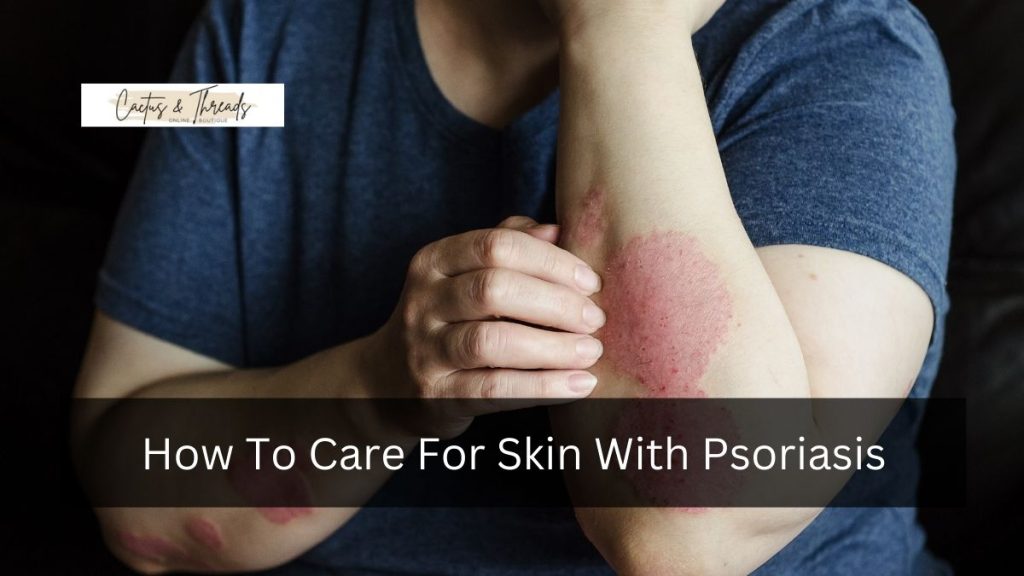
Psoriasis is a skin condition characterized by an accelerated production of skin cells, leading to a buildup that forms scaly, silver-white patches called plaques. These plaques commonly appear on the knees, elbows, scalp, and lower back, causing itchiness and discomfort.
If left untreated, psoriasis can lead to burning, stinging, or tight sensations on the skin. This guide covers essential skincare routines, tips for managing psoriasis, and lifestyle recommendations to improve your skin’s appearance and comfort.
Understanding Psoriasis: Causes and Types
Psoriasis is an autoimmune disorder affecting roughly 2% of the U.S. population. Although the exact cause remains unclear, researchers believe genetics and environmental factors play significant roles. It is not contagious and often occurs in cycles, with flare-ups followed by periods of remission.
Types of Psoriasis
- Plaque Psoriasis: The most common form, marked by red patches covered with silvery scales.
- Guttate Psoriasis: Usually seen in children and young adults, appearing as red dots on the torso and limbs, often after infections.
- Pustular Psoriasis: Characterized by pus-filled blisters on red skin, primarily on hands and feet.
- Inverse Psoriasis: Appears as smooth, red patches in body folds like the groin or armpits.
- Erythrodermic Psoriasis: A rare but severe type that covers most of the body, often triggered by sunburn or specific medications.
Essential Skincare Tips for Psoriasis
1. Gentle Cleansing
Psoriasis-affected skin requires a delicate cleansing routine to avoid exacerbating symptoms.
- Limit Bath Time: Restrict showers to 5 minutes and baths to 15 minutes, as prolonged water exposure can dry out the skin and increase itching.
- Use Lukewarm Water: Avoid hot water, which can further irritate the skin.
- Select Gentle Products: Choose moisturizing, fragrance-free cleansers instead of harsh antibacterial ones.
- Avoid Loofahs: Use your hands to wash instead, as abrasive materials can aggravate plaques.
- Pat Dry and Moisturize: Gently pat the skin dry and apply a fragrance-free moisturizer within five minutes to lock in moisture.
- Careful Shaving: Prevent flare-ups by avoiding cuts, which can trigger new plaques.
2. Keep Skin Hydrated
Hydrating your skin is key to managing psoriasis. Use products with gentle, hydrating ingredients to avoid irritation.
- Fragrance-Free Moisturizers: Avoid products with fragrances, dyes, essential oils, or drying alcohols like ethanol.
- Soothing Ingredients: Look for moisturizers containing urea (to soften scales), coal tar (to reduce itching), or honey (for potential anti-inflammatory benefits).
- Spot Test New Products: Apply new products on a small patch of skin first to ensure no adverse reactions.
3. Prioritize Sun Protection
Sunburn can worsen psoriasis symptoms, so protecting your skin from the sun is crucial.
- Use Broad-Spectrum Sunscreen: Choose an SPF 30+ sunscreen specifically formulated for sensitive skin, ideally fragrance-free and water-resistant.
- Moderate Sun Exposure: Small doses of sunlight can help improve symptoms, but avoid prolonged exposure to prevent burning.
- Protect Against Insect Bites: Bug bites can irritate the skin, so use insect repellent to minimize irritation triggers.
Recognizing Psoriasis Triggers
People with psoriasis may experience flare-ups due to various triggers. Being aware of these factors can help you manage symptoms effectively:
- Stress: Psychological stress can exacerbate psoriasis.
- Physical Injury: Sunburns, cuts, or scrapes can trigger plaques.
- Infections: Illnesses like strep throat can cause flare-ups.
- Certain Medications: Corticosteroids and other medications may worsen symptoms.
- Weather Changes: Cold, dry climates tend to aggravate psoriasis.
- Tobacco and Alcohol: Smoking and heavy alcohol consumption can intensify symptoms.
Avoiding or managing these triggers can help minimize flare-ups and maintain smoother skin.
Managing Psoriasis with Lifestyle Adjustments
A balanced lifestyle plays a crucial role in managing psoriasis symptoms. Healthy lifestyle choices can support overall skin health and potentially reduce flare-ups. Here’s how:
- Quit Smoking: Smoking can worsen psoriasis, so try to quit if possible.
- Limit Alcohol: Reduce heavy alcohol consumption to lessen potential skin irritation.
- Exercise Regularly: Physical activity promotes better blood flow and reduces stress, both beneficial for the skin.
- Monitor Your Diet: Work with a healthcare provider to understand how different foods impact your skin. Some people find that avoiding dairy or gluten can help, though individual results may vary.
- Stress Management: Engage in stress-reducing activities like yoga, meditation, or mindfulness exercises to help manage triggers related to stress.
Practical Tips for Living with Psoriasis
Living with psoriasis can be challenging, but adopting certain habits and strategies can help make it more manageable:
- Gentle Clothing and Laundry Care: Choose soft fabrics and use hypoallergenic laundry detergents to avoid skin irritation.
- Stay Connected: Consider joining support groups or online communities where people with psoriasis share tips, experiences, and encouragement.
- Mindfulness and Relaxation: Techniques like meditation or deep breathing can relieve stress, which may reduce flare-ups.
Final Thoughts
While psoriasis may not have a cure, maintaining a gentle and consistent skincare routine can significantly improve the skin’s appearance and comfort. Remember to nourish your skin with hydrating products, adopt a healthy lifestyle, and manage known triggers to reduce flare-ups.
Connect with communities for support, and consult healthcare providers for personalized advice. By giving your skin the right care, you can live more comfortably and confidently despite psoriasis.
READ ALSO:







